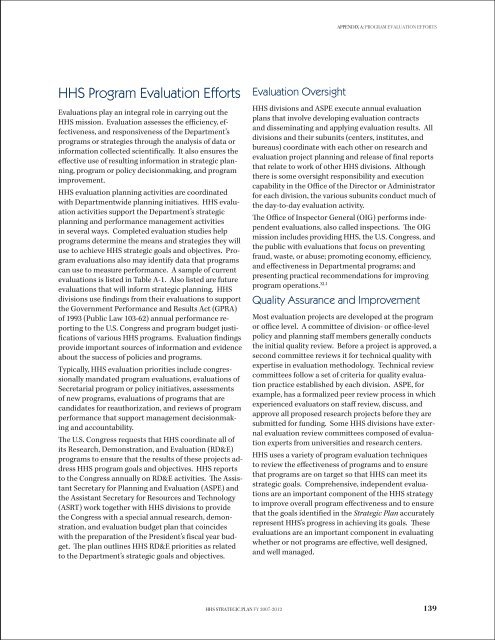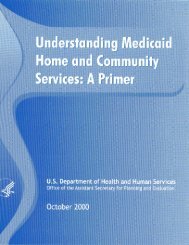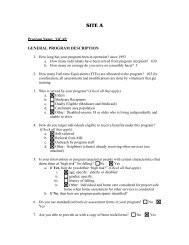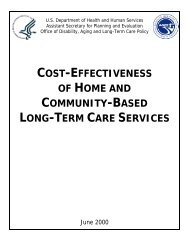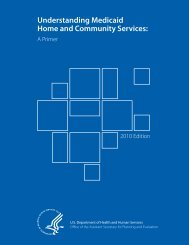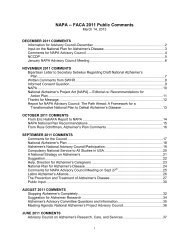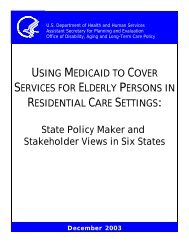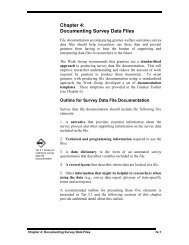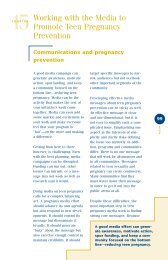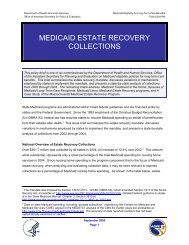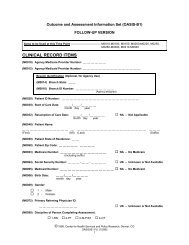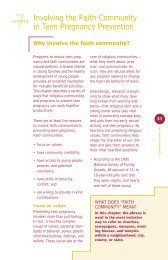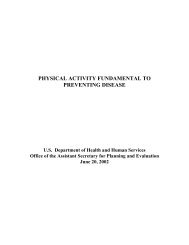STRATEGIC PLAN - ASPE - U.S. Department of Health and Human ...
STRATEGIC PLAN - ASPE - U.S. Department of Health and Human ...
STRATEGIC PLAN - ASPE - U.S. Department of Health and Human ...
You also want an ePaper? Increase the reach of your titles
YUMPU automatically turns print PDFs into web optimized ePapers that Google loves.
Appendix a: program evaluation effortsHHS Program Evaluation EffortsEvaluations play an integral role in carrying out theHHS mission. Evaluation assesses the efficiency, effectiveness,<strong>and</strong> responsiveness <strong>of</strong> the <strong>Department</strong>’sprograms or strategies through the analysis <strong>of</strong> data orinformation collected scientifically. It also ensures theeffective use <strong>of</strong> resulting information in strategic planning,program or policy decisionmaking, <strong>and</strong> programimprovement.HHS evaluation planning activities are coordinatedwith <strong>Department</strong>wide planning initiatives. HHS evaluationactivities support the <strong>Department</strong>’s strategicplanning <strong>and</strong> performance management activitiesin several ways. Completed evaluation studies helpprograms determine the means <strong>and</strong> strategies they willuse to achieve HHS strategic goals <strong>and</strong> objectives. Programevaluations also may identify data that programscan use to measure performance. A sample <strong>of</strong> currentevaluations is listed in Table A-1. Also listed are futureevaluations that will inform strategic planning. HHSdivisions use findings from their evaluations to supportthe Government Performance <strong>and</strong> Results Act (GPRA)<strong>of</strong> 1993 (Public Law 103-62) annual performance reportingto the U.S. Congress <strong>and</strong> program budget justifications<strong>of</strong> various HHS programs. Evaluation findingsprovide important sources <strong>of</strong> information <strong>and</strong> evidenceabout the success <strong>of</strong> policies <strong>and</strong> programs.Typically, HHS evaluation priorities include congressionallym<strong>and</strong>ated program evaluations, evaluations <strong>of</strong>Secretarial program or policy initiatives, assessments<strong>of</strong> new programs, evaluations <strong>of</strong> programs that arec<strong>and</strong>idates for reauthorization, <strong>and</strong> reviews <strong>of</strong> programperformance that support management decisionmaking<strong>and</strong> accountability.The U.S. Congress requests that HHS coordinate all <strong>of</strong>its Research, Demonstration, <strong>and</strong> Evaluation (RD&E)programs to ensure that the results <strong>of</strong> these projects addressHHS program goals <strong>and</strong> objectives. HHS reportsto the Congress annually on RD&E activities. The AssistantSecretary for Planning <strong>and</strong> Evaluation (<strong>ASPE</strong>) <strong>and</strong>the Assistant Secretary for Resources <strong>and</strong> Technology(ASRT) work together with HHS divisions to providethe Congress with a special annual research, demonstration,<strong>and</strong> evaluation budget plan that coincideswith the preparation <strong>of</strong> the President’s fiscal year budget.The plan outlines HHS RD&E priorities as relatedto the <strong>Department</strong>’s strategic goals <strong>and</strong> objectives.Evaluation OversightHHS divisions <strong>and</strong> <strong>ASPE</strong> execute annual evaluationplans that involve developing evaluation contracts<strong>and</strong> disseminating <strong>and</strong> applying evaluation results. Alldivisions <strong>and</strong> their subunits (centers, institutes, <strong>and</strong>bureaus) coordinate with each other on research <strong>and</strong>evaluation project planning <strong>and</strong> release <strong>of</strong> final reportsthat relate to work <strong>of</strong> other HHS divisions. Althoughthere is some oversight responsibility <strong>and</strong> executioncapability in the Office <strong>of</strong> the Director or Administratorfor each division, the various subunits conduct much <strong>of</strong>the day-to-day evaluation activity.The Office <strong>of</strong> Inspector General (OIG) performs independentevaluations, also called inspections. The OIGmission includes providing HHS, the U.S. Congress, <strong>and</strong>the public with evaluations that focus on preventingfraud, waste, or abuse; promoting economy, efficiency,<strong>and</strong> effectiveness in <strong>Department</strong>al programs; <strong>and</strong>presenting practical recommendations for improvingprogram operations. XLIQuality Assurance <strong>and</strong> ImprovementMost evaluation projects are developed at the programor <strong>of</strong>fice level. A committee <strong>of</strong> division- or <strong>of</strong>fice-levelpolicy <strong>and</strong> planning staff members generally conductsthe initial quality review. Before a project is approved, asecond committee reviews it for technical quality withexpertise in evaluation methodology. Technical reviewcommittees follow a set <strong>of</strong> criteria for quality evaluationpractice established by each division. <strong>ASPE</strong>, forexample, has a formalized peer review process in whichexperienced evaluators on staff review, discuss, <strong>and</strong>approve all proposed research projects before they aresubmitted for funding. Some HHS divisions have externalevaluation review committees composed <strong>of</strong> evaluationexperts from universities <strong>and</strong> research centers.HHS uses a variety <strong>of</strong> program evaluation techniquesto review the effectiveness <strong>of</strong> programs <strong>and</strong> to ensurethat programs are on target so that HHS can meet itsstrategic goals. Comprehensive, independent evaluationsare an important component <strong>of</strong> the HHS strategyto improve overall program effectiveness <strong>and</strong> to ensurethat the goals identified in the Strategic Plan accuratelyrepresent HHS’s progress in achieving its goals. Theseevaluations are an important component in evaluatingwhether or not programs are effective, well designed,<strong>and</strong> well managed.HHS Strategic Plan FY 2007-2012139


